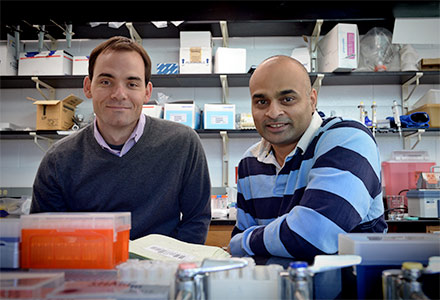UNC/Duke Team Publish on Using CRISPR Technique on Adult Mammals

A team of investigators supported in part by a $50,000 CTSA-supported Duke/UNC Collaborative Pilot Program has published results of their research into using CRISPR to treat an adult mouse model of Duchenne muscular dystrophy using a virus to deliver the gene-editing system. This marks the first time that the CRISPR technique has successfully treated a genetic disease inside a fully developed living mammal with a strategy that has the potential to be translated to human therapy.
The paper appeared on December 31, 2015 in Science. Duke's Charles Gersbach, PhD, and UNC's Aravind Asokan, PhD, who received the Duke/UNC Collaborative PIlot Program award in January 2015, are among the authors.
“A major hurdle for gene editing is delivery. We know what genes need to be fixed for certain diseases, but getting the gene editing tools where they need to go is a huge challenge,” said Chris Nelson, the fellow in Gersbach’s laboratory who led the work. “The best way we have to do it right now is to take advantage of viruses, because they have spent billions of years evolving to figure out how to get their own viral genes into cells.”
“I feel very fortunate to have a collaborator like [Aravind] Asokan nearby at UNC, who is one of the world’s experts on gene delivery to muscle,” said Gersbach, an assistant professor at the Duke Pratt School of Engineering. “He has designed viruses that can deliver genes specifically to the muscle and the heart, which is also affected in this disease. The tools he has created are really valuable for us to be able to translate our results to human application.”